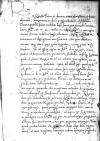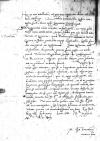List #1283
Mauritius FERBER do Ioannes DANTISCUSHeilsberg (Lidzbark), 1535-02-23
| odebrano [1535]-03-01 Rękopiśmienne podstawy źródłowe:
Pomocnicze podstawy źródłowe:
Publikacje:
| ||||||||||
Tekst + aparat krytyczny + komentarz Zwykły tekst Tekst + komentarz Tekst + aparat krytyczny
 AAWO, AB, D. 8, f. 1vunnafter42
AAWO, AB, D. 8, f. 1vunnafter42
Reverendissimo in Christo Patri et Domino, domino
Reverendissime in Christo Pater et Domine, amice carissime et frater observan(de) or observan(dissime)⌈observan(de)observan(de) or observan(dissime)⌉, longaevam in Domino prosperitatem et salutem.
Decima quinta huius redditae mihi fuere per famulum meum litterae Reverendissimae Dominationis Vestrae, quibus me adhuc solatur paper damaged⌈[atur]atur paper damaged⌉, quo aequo animo feram calumniam mihi illatam seseque exhibet in tutamen et defensionem mei honoris. De qua oblatione iterum atque iterum ago gratias ingentes eamque pari vicissitudine, ubi id officii casus in Reverendissimam Dominationem Vestram exiget, omni studio et benevolentia promereri studebo nihilque haesitans, quin et sacra
Immunem etiam feci erga
Quod Vestra Reverendissima Dominatio scire cupiat, quomodo ille novissimus articulus de praefecturis Marienburgensi et Slochoviensi intelligendus sit, ego quidem ipsum articulum sic pro mea deffinitione intelligo, siquidem rogaveram  AAWO, AB, D. 8, f. 42v Haec ex meo intellectu et pro meo captu ita illum articulum intelligo. Quibus tamen illa castra commissa sunt, nemo mihi signatim significavit.
AAWO, AB, D. 8, f. 42v Haec ex meo intellectu et pro meo captu ita illum articulum intelligo. Quibus tamen illa castra commissa sunt, nemo mihi signatim significavit.
De Cepperinis novis communicatis refero gratias, ea vera puto, nihil enim minus miror, ex quo solida pax esse debeat inter
Vestra Reverendissima Dominatio velit esse attenta, quo se a legatione Gedanensi tempestive, quantum possit, absolvat, ne inde aliis in conventu Marienburgensi, qui Quasimodogeniti celebrabitur, non praestet procrastinationem, ac ut in praefata legatione parumper temperiset(!) et quantum valeat, tempori se accomodet, eo quod contra ventos difficilis sit navigatio. Mihi pro nunc visum est, relinquens tamen cuncta innatae Vestrae Reverendissimae Dominationis et collegae sui prudentiae. Haec sub fide.
Nova nulla habeo, quae Vestrae Reverendissimae Dominationi sint, uti reor, incomperta. Cui longam, hilarem et incolumen vitam precor et commendatissimum me facio.
Ex
Reverendissimae Dominationis Vestrae totus


